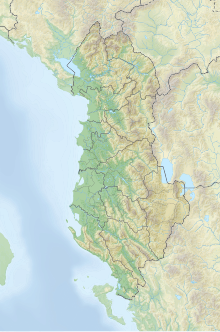|
Namazgah Mosque
The Namazgah Mosque (Albanian: Xhamia e Namazgjasë; English: Mosque of Prayer) or the Great Mosque of Tirana (Albanian: Xhamia e Madhe e Tiranës), is the largest mosque in the Balkans, located in Tirana, Albania. HistoryEven after the fall of communism in Albania, in 1991, Muslim Albanians often complained about being discriminated against. While two cathedrals (Eastern Orthodox and Catholic) were built, as of 2016 Muslims in Albania still had no central mosque and had to pray in the streets. In 1992, then president, Sali Berisha, laid the first stone of the mosque to be constructed near Namazgah square, close to the Albanian parliament. Construction was delayed after the speaker of parliament, Pjetër Arbnori, contested the plans.[2] The decision of building the mosque was taken in 2010, by then mayor of Tirana, Edi Rama. The building of the mosque is considered necessary because there are only eight mosques in the city, down from 28 in 1967. During Islamic holidays, the Skanderbeg Square is filled with Muslim worshipers, because the Ottoman-era Et'hem Bey Mosque, currently Tirana's principal mosque, has a capacity of only 60 persons. Rain makes Friday sermons impossible.[3]  Construction of the new mosque was launched in 2015 with the financing of 30 million euros ($34 million) partly coming from the Presidency of Religious Affairs of Turkey, Diyanet.[4][5] In 2015, Turkish president Recep Tayyip Erdoğan visited Albania for the inauguration ceremony of the mosque.[5] The mosque was officially opened on October 10, 2024, in a ceremony at which the Turkish president Recep Tayyip Erdoğan and Albanian prime minister Edi Rama delivered speeches.[4] The mosque is expected to increase tourism and will replace the Et'hem Bey Mosque in the city center as the main mosque. ArchitectureThe mosque's design was inspired by Classical Ottoman architecture. It has four minarets, each 50 meters high, while the central dome has a height of 30 meters. The first floor of the mosque includes a cultural center and other facilities.[6] The mosque has been constructed on a 10,000-square-meter parcel of land near Albania's parliament building. It has a capacity for up to 8,000 people to pray inside the mosque and 2,000 on the outside; totaling at 10,000 people.[7][4] References
External linksWikimedia Commons has media related to Great Namazgâh Mosque of Tirana.
|
||||||||||||||||||||||||||||||||||||||||||||||||||||||||

